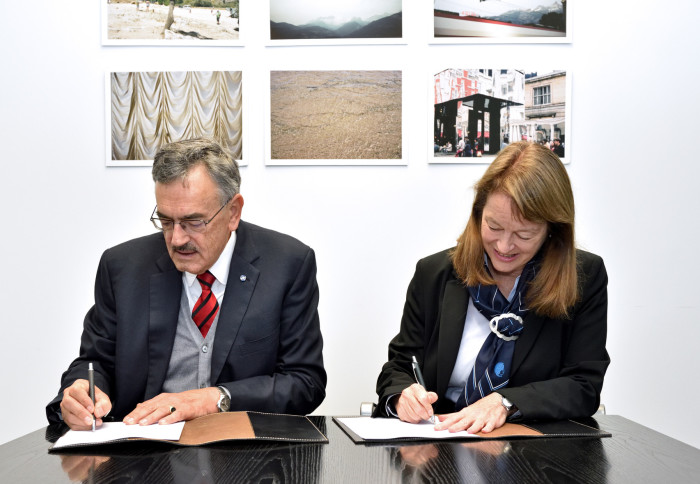Imperial and Technische Universität München fund aids education innovation

Professor Alice Gast, President of Imperial, and Professor Wolfgang Herrman, then President of TUM, signed the partnership in early 2019.
Five teams from across the College, partnering with colleagues at TUM, have been awarded funds to support them deliver experiential online education.
One of many strands of Imperial and Technical University of Munich's strategic partnership in education, research and innovation, the education seed fund aims to encourage staff and students at each institution to co-develop new applications for digital technologies. The objective is to fund project teams that are ready to develop innovative, inclusive and impactful online experiential learning opportunities in partnership with our students.
Technical University of Munich (TUM) is one of Germany’s most international and entrepreneurial universities, producing highly ranked research, like Imperial, in science, engineering and medicine.
Each individual project will be led by both an Imperial and a TUM supervisor and students from each institution.
International collaboration
The fund, which closed for entries in September 2020, invited applications which will build on relationships fostered between the TUM-Imperial community during visits to each institution in 2019. Successful education projects will strengthen these networks and improve collaboration.
Projects which support development in the following areas are encouraged. TUM and the College were particularly interested in hearing from project teams focussing on student entrepreneurship, AR or VR, multidisciplinary approaches to global challenges, and online delivery of practical labs/field trips.
The projects
The successful projects span all Faculties across the College, and a range of disciplines. Two teams discuss their future plans now that they have secured funds for their proposals.

Christopher Tucci, Professor of Digital Strategy and Innovation, and Dr Gianluigi Viscusi, Senior Research Fellow, proposed: 'Co-creative learning for engineering and robotics innovation' alongside partners at TUM.
The project aims to further develop a course implemented within the existing SCALINGS (Scaling up Co- creation: Avenues and Limits for Integrating Society in Science and Innovation) project, in which an interdisciplinary group of students co-creates responsible innovations for real-life challenges together with external partners and teaching staff. This project will build on the pilot course that took place successfully in a physical setting at the Technical University of Eindhoven in 2018/2019.
"The goal of this project is to explore effective ways of translating the lessons learned from traditional ‘classroom’ settings into digital formats. This will be more and more relevant in future due to the ‘new normal’ enforced by events such as the ongoing COVID-19 pandemic." Professor Christopher Tucci
A total of 60 students from TUM and Imperial will receive theory-oriented material through an online platform. Divided into groups, students with diverse backgrounds will focus on solving real-life challenges posed by external partners in specific multidisciplinary settings. Students will receive periodic feedback and guidance on their projects through online meetings with teaching staff and external partners. This setting aims to enact learning mechanisms not only amongst students, but also for the staff and the partners from external organizations.
Professor Tucci said: "Although co-creative approaches to education and learning are common in academia, they have mainly been applied in face-to-face settings.
"The goal of this project is to explore effective ways of translating the lessons learned from traditional ‘classroom’ settings into digital formats. This will be more and more relevant in future due to the ‘new normal’ enforced by events such as the ongoing COVID-19 pandemic."
Group mentors and external partners will guide students through live videos and virtual laboratories. Students from different institutions, countries, disciplines and graduate levels will come together to question one-size-fits-all solutions to societal challenges and shape innovation processes and products that take many perspectives into account.

Dr Stephen Green, Principal Teaching Fellow in the Dyson School of Engineering, proposed: 'TANGIBILITY in online multi-disciplinary design-engineering-innovation projects' alongside partners at TUM.
Dr Green said: "A small group of Imperial students will be paired with TUM students to develop concepts for wearable interactive AR devices – and using AR headsets and the Gravity Sketch software in remote collaborations as part of the process – resulting in functional prototypes at the end.
"Whilst the planned initiative builds from pre-existing modules and activities at both institutions, the opportunity to collaborate on ‘Tangibility’ challenges accelerates development of practical virtual working tools and approaches for virtual working in multi-disciplinary project contexts.
"Students and staff involved with the proposed project will have the opportunity for their project-based learning to be enhanced by the synergy of expertise available and the additional practical experience of trailing new approaches in their work."
The project has uncovered strong mutual interests between Imperial and TUM in these key themes and the project team are committed to exploring and developing how to expand virtual project-based learning across our institutions and in related research activity in the coming years.
Find out more
You can read more about the College's flagship partnership with TUM online. Imperial is committed to growing its European connections. As part of the TUM partnership a research seed fund has also been launched, workshops have been hosted for students to work together to tackle global challenges, and training programmes have been developed for the scientific leaders of the future.
Article text (excluding photos or graphics) © Imperial College London.
Photos and graphics subject to third party copyright used with permission or © Imperial College London.
Reporter
Murray MacKay
Communications Division